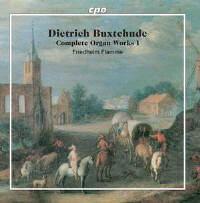Texte paru dans: / Appeared in:
|
|
|
Outil de traduction ~ (Très approximatif) |
|
|
Reviewer: James
A. Altena
Between 2004 and 2009,
Friedhelm Flamme recorded a 15-volume series (with some volumes containing
two CDs), gradually released from 2005 to 2016, of the music of the lesser
figures of the North German organ school. Several of the later volumes came
my way for (enthusiastic) reviews in these pages. With that series Flamme
established himself as one of the world’s premier interpreters of pre-Bach
German Baroque organ repertoire. Now, he begins to turn his attention to the
crowning figure, Dietrich (or Dieterich or Diderich or Didrik) Buxtehude. My
understanding is that a series of three two-CD sets is planned here.
First, some discographic
background. While I’ve doubtless likely missed an entry or two (and I ask
readers to notify me of any omissions), here are the 21 complete cycles of
Buxtehude’s organ works that I have been able to track down. They range from
five to seven CDs apiece, depending on tempos, inclusion or exclusion of
keyboard works suitable for either clavier or organ, and inclusion in more
recent sets of a couple of recently discovered works in manuscript or
musicologically edited manuscript fragments. The Linder cycle (which I’m not
sure was completed) appeared only on LP. The Alain and Chapuis sets have had
only selected works issued on CD; the complete Chapuis, Stella, and Vernet
sets are available as downloads. Alain rerecorded some pieces for Erato in
1986, which should not be confused with the earlier complete set. In
addition to the 20 cycles listed in the table below, from 1999–2006 Naxos
issued a broken consort cycle with organists Volker Ellenberger (Volume 1),
Wolfgang Rübsam (Volume 3), Craig Cramer (Volume 4), and Julia Brown
(Volumes 2 and 5–7). As with its complete Reger series, I suspect that Naxos
started with a one-off release and only later decided to create a complete
set. Of the cycles listed above, the ones I would immediately set aside are the Naxos broken consort and those of Herrick (unstylish, and I don’t care for some of his instruments and recorded sound), Koopman (perverse, and a surprising disappointment in light of his superlative Bach cycle), Kraft (badly outdated), and Rübsam (same objections as with Herrick, and to a greater degree). Among cycles I would relegate to second-tier status as being good but not exceptional are Chapuis and Vernet (who play the music in a French rather than German Baroque style), Saorgin (a once venerable choice, but again now rather dated), Stella (too Italianate instead of German in interpretation), and Stender (I simply don’t care for his interpretive approach and choices of instruments or registrations and stops, a purely subjective reaction). In addition to Vogel, that still leaves several other fine choices: Bønnerup, Spang-Hanssen, Schauerte-Maubouet, Foccroulle, Bryndorf, Leurent and LeBrun, and Davidsson. If price is no object, in addition to Vogel I find the renditions by Schauerte-Maubouet (who was just Schauerte when she made her recordings) particularly attractive. Where does Flamme promise to fit into the spectrum? He employs a historic North German Baroque organ (the Christoph Trautmann organ of the abbey church of St. George in Grauhof-Goslar), but one with well-tempered tuning. Interpretively he tilts toward the Saorgin and Vogel end of the spectrum in favoring slightly more deliberate tempos and a weightier though suitably varied palette of registrations and stops. In every work in this set, I found his playing engrossing and compelling; he keeps things moving, articulates cleanly, and has a sure sense of phrasing, rhythm, dynamics, and mood. The SACD recorded sound packs all the punch one would hope for, and CPO provides its usual exemplary booklet. When completed, this cycle will be one of the preferred choices in the Buxtehude organ sweepstakes; strongly recommended.
| |
|
|
|
|
Cliquez l'un ou l'autre
bouton pour découvrir bien d'autres critiques de CD |
|




